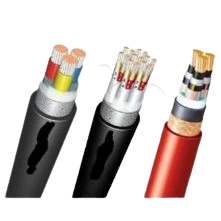Get A Quote
BIS Certification for Crosslinked Polyethylene Insulated PVC Sheathed Cables IS 7098 (Part 1): 1988

Crosslinked Polyethylene Insulated PVC Sheathed Cables, as per IS 7098 (Part 1) : 1988, are designed for use in electrical systems with working voltages up to 1100 V. These cables offer superior insulation, excellent mechanical strength, and resistance to environmental factors such as moisture, temperature, and chemical exposure.
The combination of crosslinked polyethylene insulation and PVC sheath ensures high durability and safety for power transmission, making them ideal for a wide range of domestic, industrial, and commercial applications. BIS certification confirms that these cables meet the stringent standards for electrical safety and performance, ensuring their reliability in various electrical installations
Introduction
Why is BIS Certification Necessary for Crosslinked Polyethylene Insulated PVC Sheathed Cables?
BIS certification for Crosslinked Polyethylene Insulated PVC Sheathed Cables is essential to ensure that these cables meet strict standards for safety, quality, and durability. Designed for electrical systems with voltages up to 1100 V, these cables must provide reliable insulation and protection against various environmental hazards, such as moisture, temperature extremes, and mechanical stress. The certification process ensures that the cables have undergone rigorous testing for performance and compliance with IS 7098 (Part 1) : 1988, providing manufacturers and consumers with confidence in the cable's ability to safely handle electrical power transmission. Compliance also protects manufacturers from penalties and legal challenges under the Bureau of Indian Standards Act, 2016.
Overview of Indian Standard IS 7098 (Part 1) : 1988
Process for BIS Certification
The BIS certification process for Crosslinked Polyethylene Insulated PVC Sheathed Cables under IS 7098 (Part 1) : 1988 involves the following steps:
- Application Submission: Manufacturers submit an application
form along with necessary documentation to BIS for certification.
- Documentation Review: BIS reviews the application and
supporting documents, ensuring that all information is complete and accurate.
- Factory Inspection: BIS conducts an on-site inspection of
the manufacturing facility to ensure that the production processes meet the
quality control requirements.
- Sample Testing: Product samples are tested in BIS-approved
laboratories to ensure they meet the required safety and performance standards
specified in IS 7098 (Part 1) : 1988.
- Certification Grant: Upon successful testing and inspection,
BIS grants certification, allowing the manufacturer to use the ISI mark on
their cables.
Documents Required for BIS Certification
To apply for ISI Certification for PVC-U pipes, manufacturers must provide the following documents:
● Completed application form
● Detailed manufacturing process information
● Quality control plans and test reports
● Factory layout and equipment details
● Product specifications and technical details
● Business registration proof
● Declaration of conformity to Indian standards
Additional documentation may be required based on product specifications and environmental regulations.
BIS ISI Mark Certification Costing And Timeline
To Know The Process in Detail, Please Visit:
Under BIS Registration Products ISI and CRS
Conclusion
BIS certification for Crosslinked Polyethylene Insulated PVC Sheathed Cables under IS 7098 (Part 1) : 1988 is crucial for ensuring that these cables meet the necessary safety, quality, and performance standards for electrical applications with voltages up to 1100 V. Compliance with this certification guarantees reliable, durable, and safe operation, making these cables suitable for power distribution systems and other high-voltage applications. Manufacturers seeking to sell their cables in India must obtain BIS certification to ensure market acceptance and compliance with Indian regulations. EVTL India offers expert consultancy services to manufacturers seeking BIS certification for their cables. With extensive experience in managing BIS application processes, documentation, and regulatory compliance, EVTL India ensures a smooth and efficient certification journey, helping manufacturers meet all necessary standards and gain access to both domestic and international markets.
Free Call Back
Latest News & Update
📅 BIS Critical Component List (CCL) Updates for Solar PV Modules
🕒 BIS Fee Concessions for MSMEs and Startups | EVTL India
📅 Guidelines for Implementation of Essential Requirements for Security of CCTV
🕒 Omnibus Technical Regulation (OTR) Amendment Order, 2025
🕒 Extension of Timeline for Filing Annual Returns by Battery Producers
📅 Extension of Timeline for Filing Quarterly and Annual Returns for E-Waste
🕒 Extension of Concurrent Running Period for IS 302-1: 2008 and IS 302 (Part 1): 2024
🕒 BIS Guidelines for Grant of Licence (GoL) | EVTL India
📅 CPCB Guidance on filing of Application, Fees and more
🕒 CPCB Notification on Labelling of Plastic Packaging
📅 Mandatory Compliance for Input Materials of Steel and Steel Products for Imports
🕒 BIS Guidelines for Scheme-X Certification for OTR-Regulated Products
📅 BIS Upgrades Product Certification License Numbers to 10-Digit Series
🕒 BIS Certification No Longer Mandatory for 14 Chemical & Polymer Categories
Why Choose EVTL INDIA
Expertise in Indian Regulatory Standards
End-to-End Support
Trusted by Top Indian & Global Brands
Fast Processing & Transparent Pricing
Strong Liaison with Indian Authorities
Company Profile














